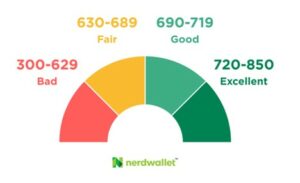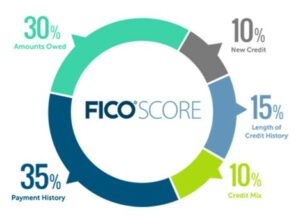Your credit score is essentially your report card on how well you handle your money.

The goal is to have a score of 750+. This will result in lenders giving you better rates/terms.
But we want to go for great.
What Affects Your Credit Score?
Source: myFICO
Your score will fluctuate all the time. Please do not look at your credit score daily. Check your score at least twice a year to make sure everything seems right.
Focus on the top three categories to improve your score:
- Payment History: Pay your bills on time, set up automatic payments when possible, and try and pay your balance off in full each month. If you can’t, go above and beyond the minimum monthly payment.
- Credit Utilization: Don’t use a lot of your available credit and become overextended. Ideally, you keep your credit utilization lower than 30% but the lower the utilization the better. Don’t hesitate to ask for credit line increases. Not so that you can spend more, but this may help lower your credit card utilization and boost your score.
- Length of Credit History: Get started now, the longer your credit history, the better your score will be.
Why Your Credit Score Is Important:
Good credit will save you money. Let’s look at mortgages for example.
Let’s say you buy a $500,000 house, put 5% down on a 30-year fixed mortgage, with an interest rate of 7.21%, your payment might be around $3,626/month.
But if your interest rate is 8.80%, using the same details from above, your payment would be $4,153/month.
So the difference between a credit score of 760+ and 620-639 can potentially save you $527/month or $6,324/year. Over the life of the 30 year loan you would end up paying roughly $189,720 more in interest if your credit score was between 620-639 compared to 760+.
Don’t focus on the small stuff such as cutting back on your latte purchases. Focus on the items that could potentially save you thousands of dollars in interest charges.
Get the big things right.
Credit Cards:
This may seem counterintuitive, but credit cards can be a useful tool for building credit and earning rewards, as long as you use them responsibly.
Who even carries cash anymore? Credit cards are convenient but also dangerous.
If you have cash in your pocket, you know right away if you can afford the purchase or not.
With a credit card, “welllll I can probably swing this..”
Ensure you are not spending more than your income. Currently, the average interest rate on credit cards is north of 20%. If you are holding a credit card balance and trying to build your wealth, you might as well be swimming in concrete.
FWIW – If you are someone who still uses a debit card for every transaction, I would suggest you reconsider. Just ask Frank Abagnale from ‘Catch Me If You Can’.
How Many Credit Cards Should You Have:
I’d recommend you only have 1-2 credit cards. I prefer simplicity and it can get difficult to manage several credit card balances. Don’t open a credit card with every promotional offer you get in the mail.
Opening several new accounts in a short period of time looks risky from a credit perspective and may hurt you.
Also, consider having different networks. For example, when I went overseas earlier this year, many places in Europe did not accept Discover, so I ended up using my Visa credit card for the entire trip. Provided me flexibility.
For the cards you don’t use anymore (J Crew, Khols, etc.) I would cut those cards up, so they are out of sight out of mind, and you don’t increase those balances.
Experts may advise you to not cancel these cards altogether. Reason being if you cancel them, it may negatively impact your credit utilization.
But close the card if it has high annual fees, you are too tempted to use it, or maybe you had a joint account with a significant other and that relationship went about as well as the 2023 Patriots season.
Closed accounts will still show up as part of your credit history, but as long as everything else is good, having a lot of cards shouldn’t hurt your score.
Mindset Around Cash Back:
Let me make one point abundantly clear: you don’t become wealthy from cash back rewards. It’s just a sweetener.
Look to utilize your credit card on purchases you would make regardless. Essentially you are getting an interest free loan (as long as you pay back ASAP) and get cash back via rewards.
Some credit cards give you a flat rate on rewards (say 1.5% on every purchase), while others offer higher rewards for select categories (gas, groceries, restaurants, etc.)
I don’t use a travel program card, although this can be a great incentive to maybe get a free flight out of it. I defer to setting up an airline rewards program with the ones I fly the most frequently with.
There may be a cap on how much cash back you can earn during a given month, quarter, or year. Other times, your rewards can expire if you don’t use them. Find something that’s simple and offers rewards on categories you already spend on.
My default use of cash back is to put the cash towards my credit card balance. But there are other options such as gift cards, deposit the cash into your bank account, etc.
Other Features:
Over the years, I’ve used my credit card to help me track my spending: where am I spending the most? Does that make sense? Are there ways I can try and cut that back?
Discover has a nice feature that identifies your recurring charges. If you end up canceling a card, they will notify you of charges that you may need to update the payment option.
Discover also offers fraud protection and notifies you if someone is trying to use your card or social security number.
Some cards offer credit advances. However, you end up paying a lot in fees and interest for not a large loan. This is typically not a good place from which to loan money.
If you have a large balance and are getting smoked with interest, consider transferring the balance to a 0% APR introductory card and creating a plan to pay this off while getting a break on interest charges.
Your credit score is in your direct control. Take action today to find out your current standing and a plan to improve it.
Disclosure: This material is for general information only and is not intended to provide specific advice or recommendations for any individual.
Tracking #504989-1


